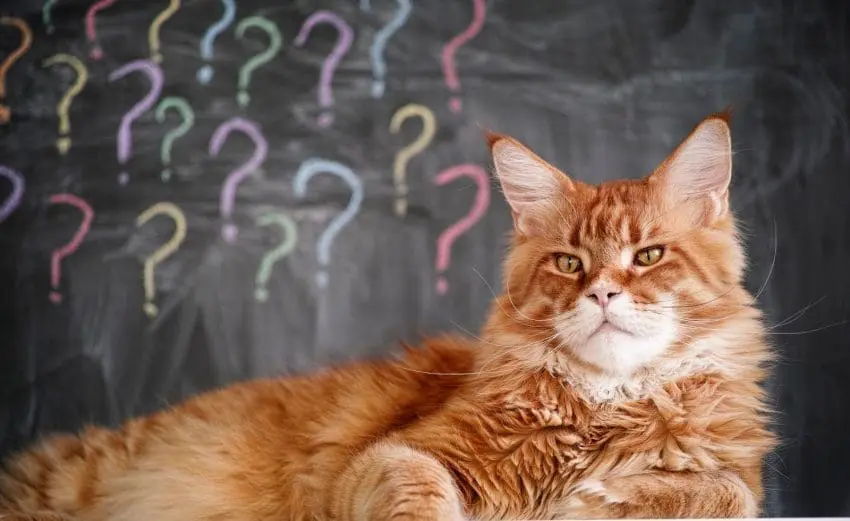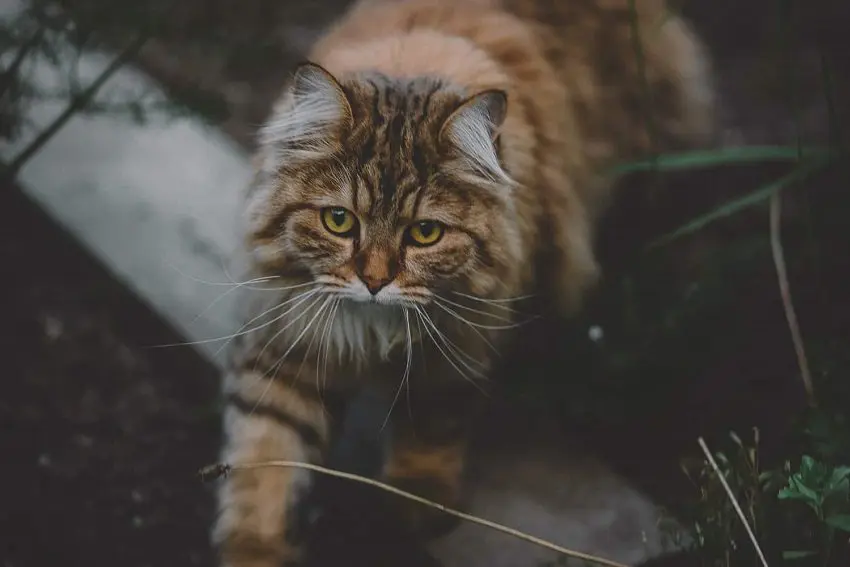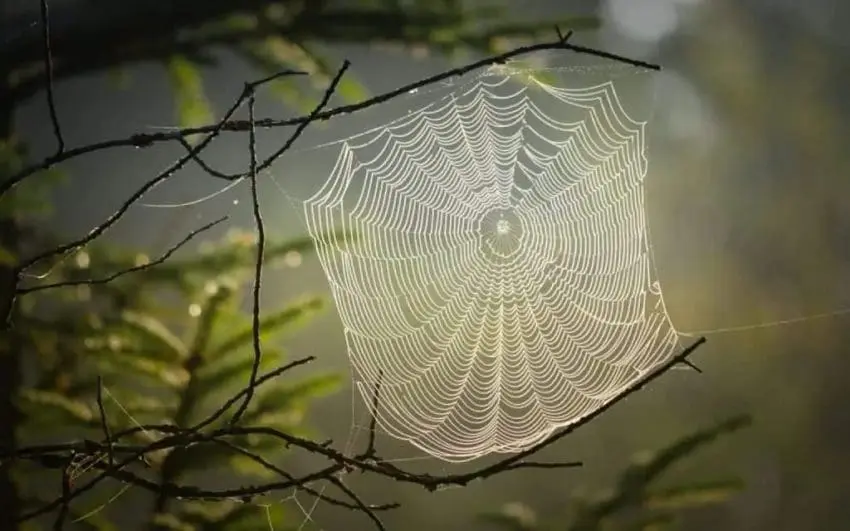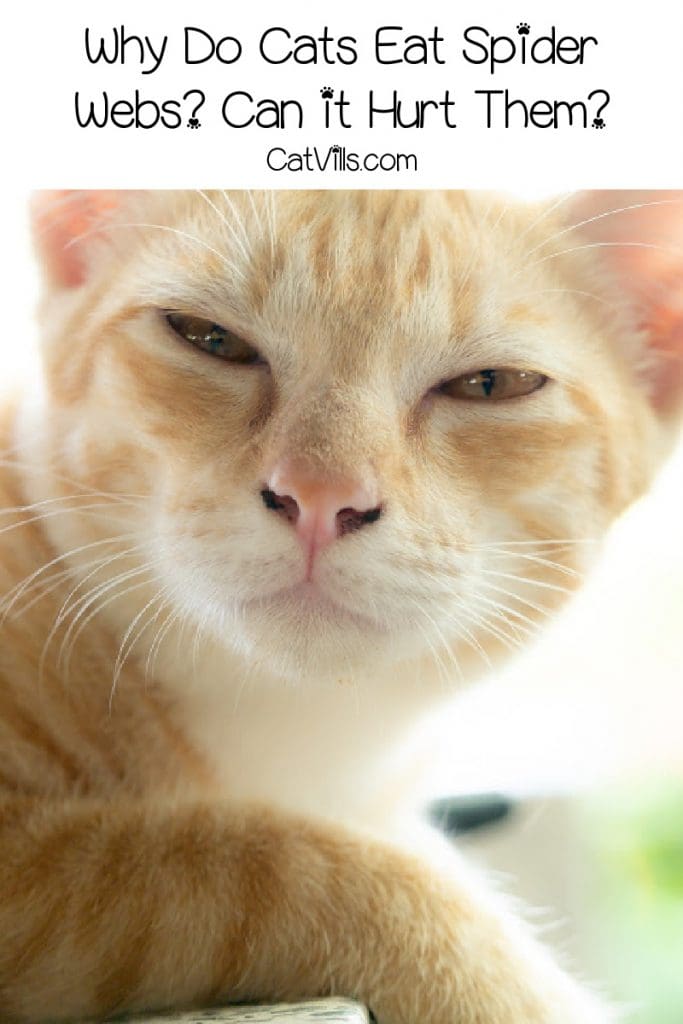Last Updated: 2 years ago
Are you wondering, “Why does my cat eat spider webs?”
Cats certainly behave in mysterious ways; they often have us pondering some pretty random questions.
Let’s explore some of the reasons and find out whether eating spider webs can hurt your cat.
Reasons Why Does My Cat Eat Spider Webs?

Cats eat spider webs for two main reasons.
- They aren’t getting enough of the nutrients they need from their diet and eat the web as a supplement.
- They have feline pica, a disorder that causes cats to eat non-food objects and substances, such as spider webs.
REASON 1: Cats Eat Spider Webs for Nutrition
As strange as it sounds, eating cobwebs could be your cat’s way of topping up her intake of vital nutrients.
Just like humans, cats crave certain things if their bodies are lacking in particular nutrients.
A study even found that, when given a choice, cats would pick their next meal based on its nutritional value rather than its flavor.
The Nutritional Value of Spider Webs
So what is it about spider webs that makes them an attractive snack for our feline friends?
The silk strands of a spider’s web are made up of protein and various amino acids.
Therefore, we can assume that cats would look to cobwebs if they were deficient in protein.
Cats aren’t the only creatures to eat spider webs. Indeed, even some spiders will eat their web as a way to recover the protein they lost in producing it.
Your Cat’s Dietary Needs
No two cats are the same; they will all have different dietary requirements based on their breed, genetics, age, current weight, and activity level.
There are, however, some basic building blocks that make up a healthy, well-rounded feline diet.
- Protein and essential amino acids such as Taurine.
- Fat and essential fatty acids like omega-3.
- Minerals: e.g., calcium and sodium.
- Vitamins: e.g., A, B, C, D.
- Water.
Oddly enough, there is no recommended minimum intake of carbohydrates for cats. They use protein and fat as their primary source of energy.
Other Weird Things Cats Eat
Spider webs aren’t the only unusual things that cats eat in an attempt to supplement their diets or improve their health.
- Cat litter or dirt: Cats eat dirt or litter if they need more iron.
- Grass: It contains vitamins and can help with an upset stomach.
Some cats will also chew on larger objects for similar reasons. Examples include cats chewing metal and wood.
REASON 2: Pica in Cats

If your cat eats spider webs, it could be a sign that they need a little more protein in their diet.
However, it could also indicate that they are suffering from a disorder called pica.
What is Feline Pica?
Pica is a condition where cats eat inedible or non-food items. Pica is not limited to cats; indeed, humans can also suffer from the disorder.
Chewing and experimenting are normal behaviors for cats, especially kittens.
But problems arise when chewing becomes an obsession and your cat swallows things that aren’t food.
4 Causes of Feline Pica
There is no one defined cause for pica in cats. Indeed, in many ways, it is a visible symptom of a deeper-rooted issue.
Causes include:
- Inadequate diet or dietary deficiencies
- Medical issues like anemia.
- Genetics: Some breeds are more likely to chew wool as kittens.
- Boredom or lack of stimulation.
6 Symptoms of Feline Pica
As well as seeing your cat routinely eating spider webs, you will likely notice other symptoms if they are suffering from pica.
These include:
Just in case you were wondering, not every cat with pica will eat spider webs. Cats try to eat everything from soap and clay to fabric and plastic.
Dealing With Feline Pica
If you suspect your cat has pica and is eating things she shouldn’t, it’s essential to have a vet check her over.
Her pica could be a sign of an underlying problem, and the act of eating inedible objects can cause internal blockages and complications.
Strategies for managing the condition long-term include:
- Removing the offending object from your cat’s environment
- Make the item unattractive by using scents that cats dislike.
- Keep your cat indoors if their pica obsession is outdoors.
- For chewers, give them a toy or something safe to chew instead.
- Enrich the lives of cats with boredom-induced pica.
Your vet will help you come up with the best course of action and aid you in developing strategies to help your cat break her habit.
What to Do If Your Cat Eats Spider Webs

Your cat isn’t going to suffer any direct harm from eating spider webs; after all, the silk strands are made up of proteins.
1. Do You Need to Worry Then?
If eating the odd spider web isn’t going to hurt your cat, is it really a reason to be concerned? Perhaps slightly, if it has become a regular thing.
It’s by no means an emergency situation, but rather a signal that you need to look a little deeper into the reason why your cat is eating spider web.
As we discovered earlier, chowing down on cobwebs could be a sign that your cat isn’t getting enough protein or that she is suffering from pica.
2. See a Vet
Play it safe and remove all doubt from the equation. Your vet will be able to address your cat specifically, answer your questions, and give you a bespoke solution.
In addition, it will put your mind at ease. From there, you can look at managing the problem and your cat’s health.
3. Review Food and Diet
If your cat munches her way through cobwebs for dietary reasons, your vet will help you review her diet and food.
Choosing the right food and working out portion sizes will ensure your cat is getting all of the nutrients she needs from her food bowl and help curb her web cravings.
4. Remove the Spider Webs
Your cat may not want to stop eating spider webs right away, so you’ll have to help her break the habit.
Remove any spider webs from the areas your cat has access to, and limit or supervise her trips outside if this is where she is finding them.
Symptoms of spider bites in cats
Symptoms vary depending on the spider, but can include:
- Swelling and redness around the bite.
- Muscle cramping and rigidity.
- Vomiting.
- Diarrhea.
- Tremors.
If in doubt, identify the spider if possible and take your cat to the vet.
FAQs
WILL EATING SPIDER WEBS HARM MY CAT?
No. Spider webs are not poisonous to cats and will not hurt them. However, eating cobwebs can be a sign of underlying health issues or dietary deficiencies. You’ll need to consider the specific circumstances of your cat’s behavior to determine what these health issues could be.
WHAT IF MY CAT EATS A SPIDER?
Eating a spider is unlikely to cause your cat any problems. Even in the case of venomous spiders, unless they actually bite your cat, she will digest the venom harmlessly. However, spider bites can be dangerous for cats.
WHY DO CATS EAT SPIDERS?
Cats eat spiders simply because they’re there. Cats are natural hunters, after all. Spiders are common and more likely to be found in your house than mice or birds.
Consequently, spiders are very much on the menu and very much on your cat’s prey radar.
In Summary
You asked, “Why does my cat eat spider webs?” In answering, we discovered a few things.
Spider webs are a source of protein for cats. If your cat is eating them is may mean she isn’t getting enough protein in her diet.
Eating spider webs could also be a sign of pica, an eating disorder in which cats eat non-food items.
In either case, if your cat is regularly eating spider webs, it’s worth arranging a visit to the vet to make sure everything is okay.
Does your cat eat spider webs? Share your story in the comments below.
Resources:

